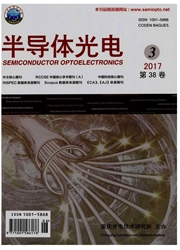

 中文摘要:
中文摘要:
The dipping process was recorded firstly by high-speed camera system; acceleration time, speed, and dipping time were set by the control system of dipping bed, respectively. By image processing of dipping process based on Otsu’s method, it was found that low-viscosity flux glue eliminates the micelle effectively, very low speed also leads to small micelle hidden between the bumps, and this small micelle and hidden phenomenon disappeared when the speed is ≥0.2 cm s-1. Dipping flux quantity of the bump decreases by about 100 square pixels when flux viscosity is reduced from4,500 to 3,500 mpa s. For the 3,500 mpa s viscosity glue, dipping flux quantity increases with the increase of the speed and decreases with the increase of the speed after the speed is up to 0.8 cm s-1. The stable time of dipping glue can be obtained by real-time curve of dipping flux quantity and is only 80–90 ms when dipping speed is from 1.6 to 4.0 cm s-1. Dipping flux quantity has an increasing trend for acceleration time and has a decreasing trend for acceleration. Dipping flux quantity increases with the increase of dipping time, and is becoming saturated when the time is ≥55 ms.
 英文摘要:
英文摘要:
The dipping process was recorded firstly by high-speed camera system; acceleration time, speed, and dipping time were set by the control system of dipping bed, respectively. By image processing of dipping process based on Otsu's method, it was found that low-viscosity flux glue eliminates the micelle effectively, very low speed also leads to small micelle hidden between the bumps, and this small micelle and hidden phenomenon disappeared when the speed is >= 0.2 cm s(-1). Dipping flux quantity of the bump decreases by about 100 square pixels when flux viscosity is reduced from 4,500 to 3,500 mpa s. For the 3,500 mpa s viscosity glue, dipping flux quantity increases with the increase of the speed and decreases with the increase of the speed after the speed is up to 0.8 cm s(-1). The stable time of dipping glue can be obtained by real-time curve of dipping flux quantity and is only 80-90 ms when dipping speed is from 1.6 to 4.0 cm s(-1). Dipping flux quantity has an increasing trend for acceleration time and has a decreasing trend for acceleration. Dipping flux quantity increases with the increase of dipping time, and is becoming saturated when the time is >= 55 ms.
 同期刊论文项目
同期刊论文项目
 同项目期刊论文
同项目期刊论文
 期刊信息
期刊信息
